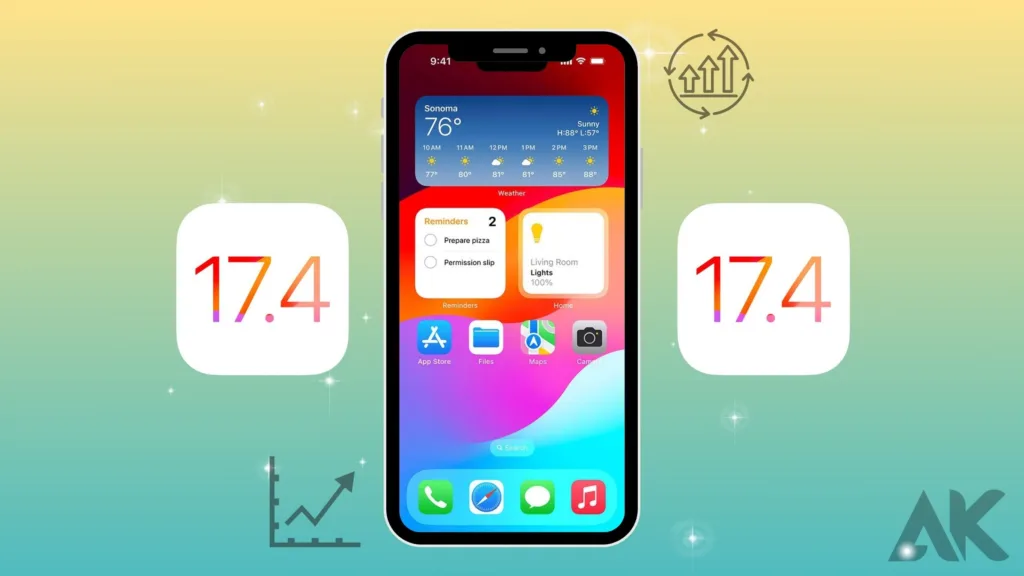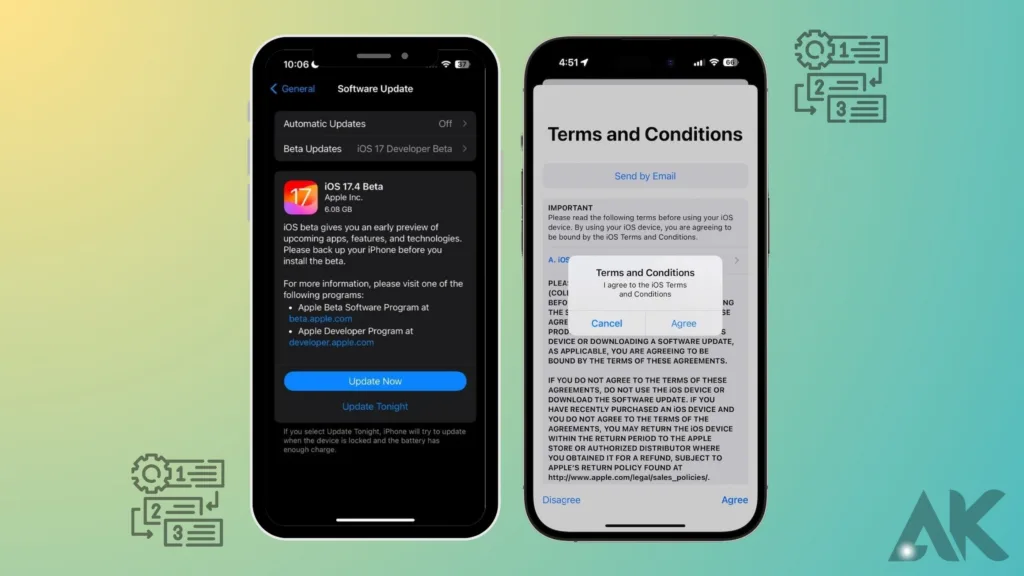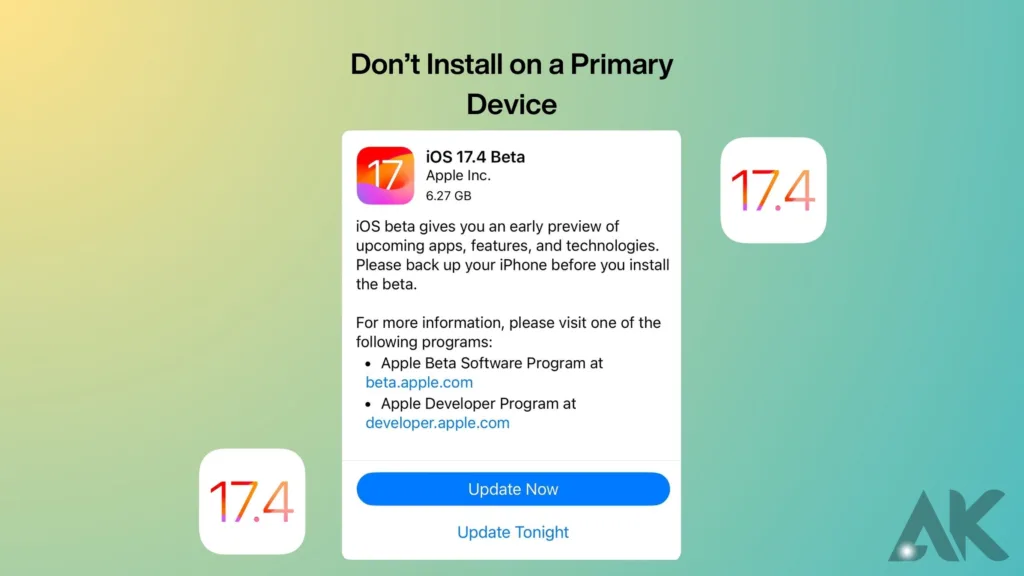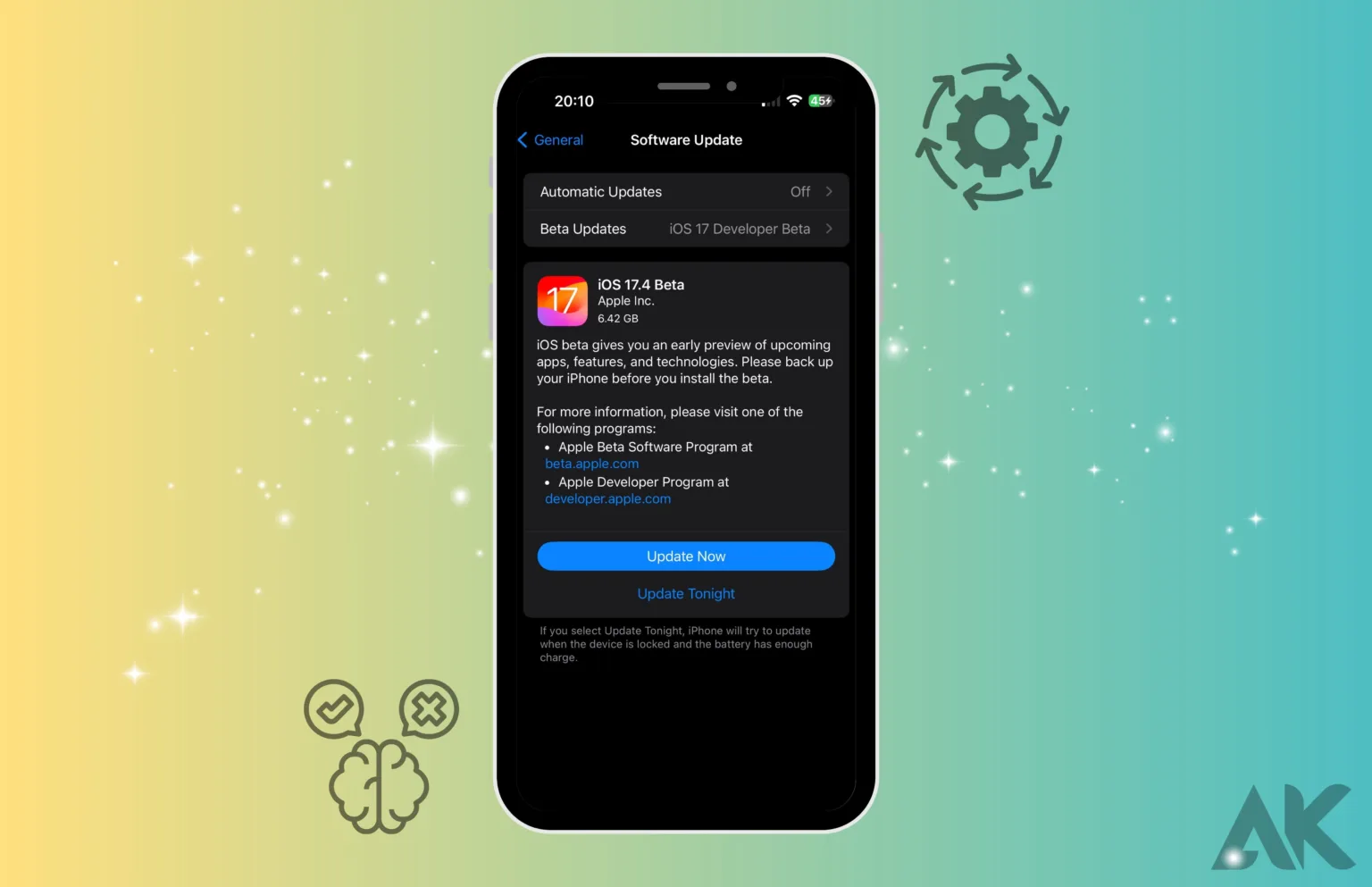Should you update to iOS 17.4? A new beta version of iOS 17.4 has been released by Apple. Additionally, most individuals would be better off sticking with stable software, even though you might be tempted to give it a try on your iPhone.
Apple’s fourth milestone update for iOS 17, known as iOS 17.4, is anticipated to remain in beta testing for some time.
Although Apple hasn’t given the program an official release date, the final version is scheduled for March.
You could be tempted to download the beta if you’re having trouble with iOS 17.3 or if you’re just curious to try new iOS software before it’s made available to the general public.
Allow us to walk you through the top arguments for trying the iOS 17.4 beta as well as the top arguments for sticking with iOS 17.3, or whichever version of iOS your iPhone is presently running, if you’re thinking about switching.
Help Improve iOS 17.4

Should you update to iOS 17.4?:
The iOS 17.4 beta is best downloaded for a noble purpose.
You may assist Apple with improving the final product by downloading the beta on your iPhone and helping to weed out bugs and performance issues.
Try the beta if you’re sick of hearing your friends and family whine about problems and/or handling software problems.
Make sure to notify Apple of any problems you encounter if you choose to test the iOS 17.4 beta. The engineers of the company can then work on fixes.
Try New Features
Should you update to iOS 17.4?”
Download the beta to experience iOS 17.4’s features now.
Significant updates to iOS, Safari, and the App Store in the EU are included in iOS 17.4. These modifications are in accordance with the EU’s Digital Markets Act (DMA).
“More than 600 new APIs, expanded app analytics, functionality for alternative browser engines, and options for processing app payments and distributing iOS apps” are among the “changes,” according to Apple.
Developers may start testing the iOS 17.4 beta and find out more about the modifications for EU apps on the company’s new Apple Developer Support page.
The iPhone’s keyboard will get additional emoji characters in iOS 17.4. Among the many other new characters are an edible mushroom, a lime, and a phoenix.
The Podcasts app has been upgraded and is now part of the iOS 17.4 beta. Transcripts created automatically are now available for viewing within the app.
Please be aware that non-beta users—such as those running iOS 17.3—will not be able to see these emojis before downloading the beta. Rather, they will see a box with an asterisk (?).
As the beta develops, Apple may add or remove features from iOS 17.4, so be sure to check back for updates whenever the firm makes a new beta available.
Install If You Work in IT

Should you update to iOS 17.4?: It should go without saying that if you are employed in the IT sector, you should install the iOS 17.4 beta in order to test out new applications and services.
Following the release of a new iOS version by Apple, we consistently receive complaints regarding enterprise issues. There won’t be any changes in iOS 17.4.
Should you work as an IT specialist assisting end users at your organization, you ought to set up and utilize the iOS 17.4 beta on a device within the beta testing phase.
You can better prepare for support calls and trouble tickets from coworkers and clients who upgrade their iPhones to the software by testing the iOS 17.4 beta.
Don’t Install on a Primary Device

Should you update to iOS 17.4?:
Keep your iPhone running stable software if you own just one.
The iOS 17.4 beta should not be used if your productivity on the iPhone depends on the apps on it. Bugs, performance concerns, and app compatibility difficulties could arise.
It’s possible for the most frequently used apps to frequently crash or freeze. If you enjoy using your device to watch shows, play games, or complete work, this isn’t the best option.
Use your spare iPhone if you happen to have one lying around.
Apple “strongly” advises installing iOS beta software on backup devices in its iOS Beta FAQ.
Don’t Install If You Can’t Stand Bugs
Should you update to iOS 17.4?: Stay away from the iOS 17.4 beta if you can’t manage to cope with bugs, bad performance, or any security risks.
The usual suspects—abnormal battery drain, Wi-Fi and cellular data issues, UI latency, synchronization issues, and other issues—are among the current list of Should you update to iOS 17.4? concerns.
Future software updates from Apple may have issues of their own, but they will still improve the product overall. Some problems you might be able to resolve on your own, but others could need Apple to address in a later release.
You can only go back to iOS 17.3 or iOS 17.2.1 stable software if you have issues with the beta. There is no longer a way to downgrade to earlier iOS versions.
Therefore, bear that in mind if you’re enjoying iOS 17.2 or lower. You won’t be able to revert once you upgrade to iOS 17.4 beta.
Install iOS 17.3 for Better Security
Should security be a concern for you and you were unable to get iOS 17, consider updating to iOS 17.3 as soon as possible.
15 new security updates for iPhone are included in the iOS 17.3 update. These will assist in preventing damage to your device and its data.
Additionally, the program gives the iPhone Stolen Device Protection. By requiring Face ID or Touch ID to access passwords, make purchases in Safari, and more, it makes your iPhone and Apple ID more secure.
If someone manages to crack the passcode on your iPhone, this will come in handy.
Regarding previous releases, iOS 17.2 brought ten additional security patches to the iPhone. You may find out more information by visiting Apple’s security website.
iMessage Contact Key Verification was also added to iOS 17.2, enhancing iMessage security. Also, the business patched a vulnerability that allowed the Flipper Zero multi-tool to lock up iPhones.
There were two security fixes included in iOS 17.1.2. Each had a connection to WebKit. You may find out more information by clicking this link.
iOS 17.1 updated iPhones with 18 security patches. It resolved problems with WebKit, the status bar, the weather, and other areas.
Two updates were released with iOS 17.0.3 to address two security flaws that Apple found in the program. Visit this link to read more about the patches.
Three significant updates for iPhone were released with iOS 17.0.1. You may learn more about the specifics of these enhancements on Apple’s security page if that interests you.
Regarding iOS 17, it included more than forty new security patches. a startling amount, to put it mildly. You can visit Apple to find out more about them.
Together with such fixes, iOS 17 also introduces several new privacy and security features, such as enhanced communication safety outside of messages.
It now includes the system-wide photo picker, FaceTime, AirDrop-sent material, and Contact Posters in the Phone app. Sensitive images and videos can now be blurred out before you decide to watch them.
Additionally, an enhanced lockdown mode is available to safeguard you from online threats.
Additionally, Apple has increased sharing permissions so that you can share more content with the apps on your phone with greater control.
The business also mentions that Voice Memos encrypts not just the recordings itself but also the titles of recordings saved in iCloud as of iOS 17.
Should you have bypassed previous iterations of iOS, the security patches from prior releases will also be included in your iOS 17.3 upgrade.
Conclusion : Should you update to iOS 17.4?
Decision Time: Should you update to iOS 17.4?: Apple has released a new beta version of iOS 17.4, which is expected to remain in beta testing for some time. The final version is scheduled for March. The beta is a good opportunity to help Apple improve iOS 17.4 by weeding out bugs and performance issues. If you’re tired of dealing with software issues or hearing complaints, give the beta a try.
The beta includes significant updates to iOS, Safari, and the App Store in the EU, in accordance with the EU’s Digital Markets Act (DMA). The beta also includes new emoji characters for the iPhone’s keyboard, and the Podcasts app has been upgraded. Non-beta users will not see these emojis before downloading the beta.
For IT professionals, the iOS 17.4 beta is recommended to test out new applications and services. However, there won’t be any changes in iOS 17.4. It’s better to prepare for support calls and trouble tickets from coworkers and clients who upgrade their iPhones to the software.
The iOS 17.4 beta should not be installed on a primary device as it may cause bugs, performance issues, and compatibility issues. Apple strongly advises installing iOS beta software on backup devices. If you cannot handle bugs, bad performance, or security risks, stay away from the beta. Future software updates may address these issues, but they will still improve the product overall. If you are enjoying iOS 17.2 or lower, you cannot revert once you upgrade to iOS 17.4 beta.
FAQs
How long does it take to update to iOS 17.4?
The time taken to update to iOS 17.4 may vary depending on your device and internet connection speed. On average, the process takes approximately 30 minutes to an hour.
Can I revert to a previous iOS version if I don’t like iOS 17.4?
Apple typically does not allow users to downgrade to previous iOS versions once they have updated to a newer release. It’s advisable to research and consider your decision carefully before updating.
Will iOS 17.4 slow down my device?
iOS 17.4 is designed to optimize performance and should not significantly slow down your device. However, older devices may experience slight delays due to hardware limitations.
Is iOS 17.4 compatible with my device?
iOS 17.4 is compatible with a range of Apple devices, including iPhones and iPads. However, it’s essential to check compatibility before initiating the update.

